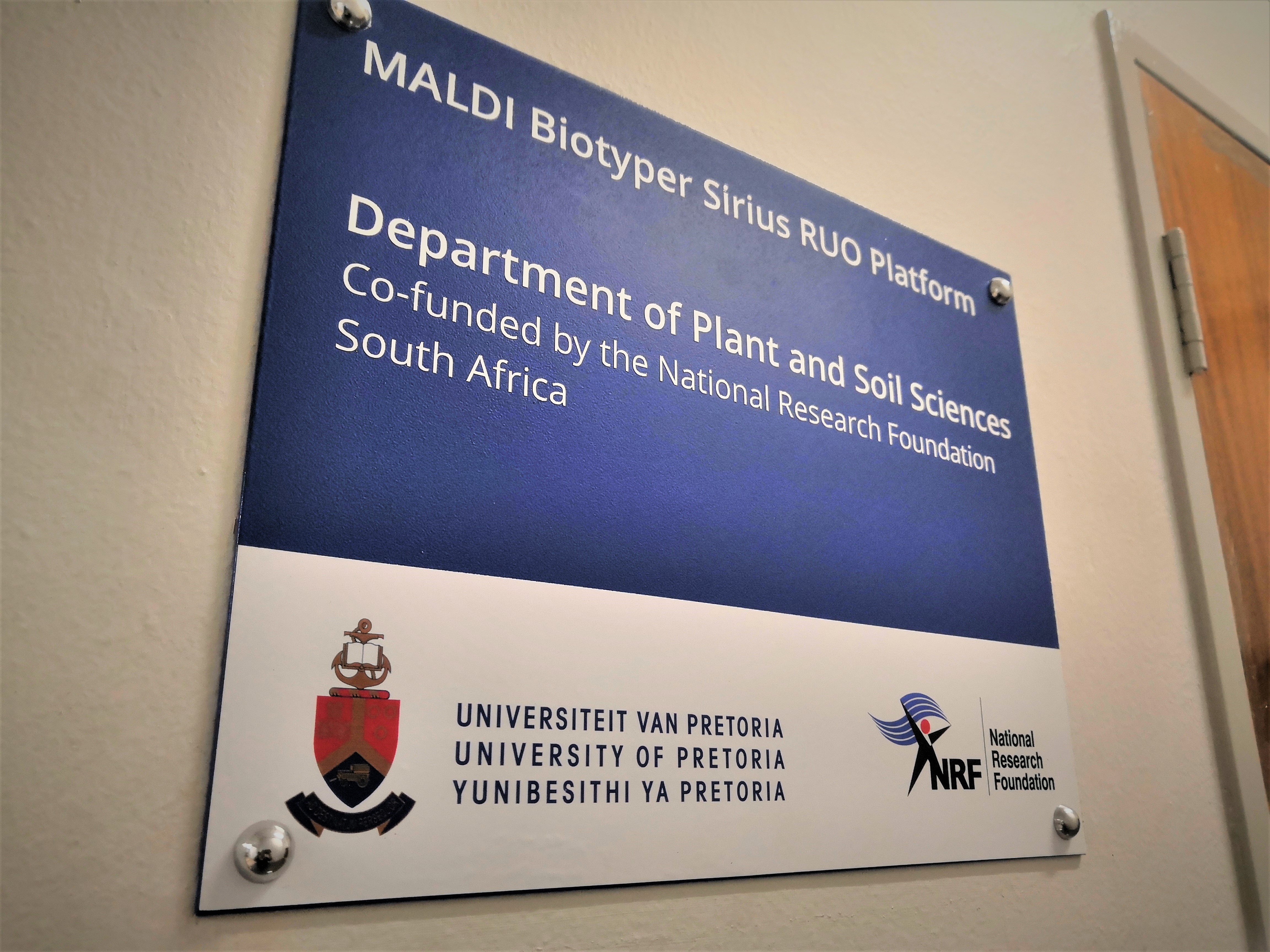MALDI-TOF DIAGNOSTICS @ UP
The Plant to Food Research group provides a microbial diagnostic service using the MALDI-TOF Biotyper microflex and MALDI-TOF Biotyper sirius RUO. The service is available for research purposes to all students and staff of the University of Pretoria as well as collaborators and other research institutions.

The MALDI Biotyper identifies microorganisms using matrix assisted laser desorption/ionization time of flight mass spectrometry (MALDI-TOF) mass spectrometry (MS) imeasuring the unique protein fingerprint of an organism. Specifically, the MALDI Biotyper measures highly abundant proteins that are found in microorganisms. The characteristic patterns of these proteins are used to reliably identify a particular microorganism by matching the respective patterns with an extensive open database to determine the identity of the microorganism down to species level. The current data base is however still being developed and a wide range of environmental, agricultural and food associated microorganisms are still not in the system. As part of our research programme we plan to build this unique database for South Africa. We therefore would like to request that selected important microorganisms be used to expand the database.
The MALDI Biotyper System is:
- Highly accurate and reproducible
- Applicable to a wide range of microorganisms – bacteria, fungi, yeasts
- Much faster than traditional methods
- Cost effective
Guidelines for the use of the diagnostic service:
- Complete a sample submission form and submit to [email protected] or [email protected].
- Upon receipt of the sample submission form a quote will be send to the client for the analysis to be done. Clients outside the University of Pretoria should then provide a purchase order. Clients within the University of Pretoria should provide proof of transfer of the amount on the quote. No booking will be made unless the purchase order or proof of transfer was received. An invoice will be send to Clients outside the University of Pretoria of which payment is strictly within 30 days of receipt of the invoice. Failure to pay will result in suspending the service to the client.
- Upon receipt of the purchase order or proof of transfer the samples will be booked and the client notified of the booking date. The date may be changed if it does not suit the client.
- There is no restriction on the number of samples that can be analysed, however the maximum number of samples that can be analysed per day is 94.
- Make sure that your bacterial and yeast cultures are pure cultures.
- For health and safety reasons we cannot accept live cultures. All cultures must be inactivated using the shipping protocol (SOP/GT066). Make sure that the resulting pellet is visible and that it is absolutely free from media/agar particles.
- All samples should be clearly (legible) identified, i.e. have a proper code written on the bottom of the Petri dish or top of a tube no longer than 4 digits. (Samples should be labelled with a maximum of 4 digits/characters including letters, commas and numbers, eg ( E1.1/ E2/ EF1 ect./ alternatively if you have 10 samples you may label them (1 to 10). Labels should not include asterisks and exponential/scientific notation).
- Results will be sent via e-mail.
- Enquiries: Zama Zulu Tel: 012 420 3850, email: [email protected] or [email protected].
- If you would like to do Dendrogram analysis on you samples, request and complete a Dendrogram analysis form.
Terms and conditions:
- Analysis is done on a first-come-first-served basis.
- The sample submission form must be completed in full.
- Re-analysis of a sample due to inconclusive results will be treated as a new sample and should be paid for as such.
- We do not collect samples.
- We do not prepare cultures for the MADLI-TOF Biotyper analysis.
- We cannot accept responsibility for the purity of microbial cultures.
- We do not interpret results.
- We do not return samples/cultures – please ensure that you have backups.
- In the case where the results will form part of an article to be published in a journal, a copy of the publication should be sent to us for NRF report purposes.
- The following acknowledgment should also be included in any publication/thesis:
'This work is based on the research supported in part by the National Research Foundation (NRF) of South Africa (Grant specific unique reference number (UID) 74426).
- We reserve the right to use the results to expand the database and may request additional data for that purpose.
- We reserve the right to enter the results in the databank of the MADLI-TOF system. However the IP still belongs to the researcher and it will be documented as such.
The NRF and DSI logos according to the current branding policy should appear on all reports, presentations, publications and webpages that arise from any material using data generated from the MALDI-TOF biotyper.

Get Social With Us
Download the UP Mobile App